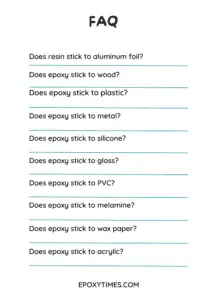Epoxy is a type of adhesive that is known for its strong bonding abilities, but like all adhesives, it is not capable of sticking to every surface. In general, epoxy is not effective at bonding to surfaces that are made of plastic, silicone, rubber, or Teflon. It can also have difficulty sticking to certain types of metal or glass, especially if the surface is smooth or has been treated with a release agent. Additionally, epoxy may not adhere well to surfaces that are dirty, greasy, or damaged.
What keeps epoxy from sticking?
There are several factors that can prevent epoxy from sticking to a surface. Some of the most common include:
- The surface is made of a material that is not conducive to bonding with epoxy. As mentioned above, epoxy does not stick well to certain types of plastic, silicone, rubber, or Teflon.
- The surface is too smooth or has been treated with a release agent. Epoxy needs a rough surface to create a strong bond, so smooth surfaces or those that have been treated with a release agent may not provide enough of a grip for the epoxy to hold onto.
- The surface is dirty, greasy, or damaged. A clean, dry, and undamaged surface is necessary for epoxy to adhere properly. If the surface is dirty, greasy, or damaged, the epoxy may not be able to form a strong bond.
- The epoxy is old or has been improperly stored. Epoxy has a limited shelf life, and if it is not stored properly, it can lose its bonding ability over time. Additionally, if the epoxy has been exposed to extreme temperatures or other adverse conditions, it may not work as well as it should.
- The epoxy is not mixed properly or applied correctly. Epoxy typically consists of two parts that must be mixed together in the correct proportions and allowed to cure for the specified amount of time. If the epoxy is not mixed properly or applied correctly, it may not bond as effectively as it should.

Does resin stick to aluminum foil?
It is not recommended to use aluminum foil as a mold for resin because resin may not stick to the foil. Resin needs a non-porous and smooth surface to create a strong bond, and aluminum foil is both porous and not particularly smooth. Additionally, aluminum foil may be coated with a release agent to prevent it from sticking to other materials, which could prevent the resin from adhering to it properly. If you need to use a mold for your resin project, it is recommended to use a silicone or plastic mold instead.
Does epoxy stick to wood?
Yes, epoxy can be used to bond wood surfaces together. Epoxy is a strong adhesive that is known for its ability to create strong, long-lasting bonds between many different types of materials, including wood. When used properly, epoxy can be an effective way to join wood surfaces together, whether you are repairing a piece of furniture, building a model, or creating a crafts project.
Does epoxy stick to plastic?
Epoxy does not stick well to plastic. This is because plastic is a non-porous material that does not provide a good surface for the epoxy to grip onto. Additionally, many types of plastic are treated with release agents that prevent adhesives from bonding to them. For these reasons, epoxy is not typically recommended for bonding plastic surfaces together. There are other adhesives that are specifically designed for bonding plastic, and it is generally better to use one of these instead.
Does epoxy stick to metal?
Yes, epoxy can stick to metal. To ensure a strong bond between the epoxy and the metal, it is important to properly prepare the surface of the metal by cleaning it and roughening it up using sandpaper or a wire brush. This will help the epoxy to adhere to the metal more effectively.
Does epoxy stick to silicone?
No, epoxy does not typically stick to silicone. Silicone is a type of rubber that is known for its non-stick properties, which make it difficult for adhesives like epoxy to bond to it. In general, it is not recommended to use epoxy with silicone materials, as the bond between the two is likely to be weak and may not hold up over time. If you need to join silicone and another material, you may want to consider using a different adhesive that is specifically designed for use with silicone.
Does epoxy stick to glass?
Yes, epoxy can stick to glass. To ensure a strong bond between the epoxy and the glass, it is important to properly prepare the surface of the glass by cleaning it and roughening it up using sandpaper or a scouring pad. This will help the epoxy to adhere to the glass more effectively. However, it is important to keep in mind that epoxy is not transparent, so it will not be invisible once it has been applied to the glass. This means that it may not be the best choice for use in applications where a clear, unobstructed view is necessary.
Does epoxy stick to PVC?
Yes, epoxy can stick to PVC. It is important to keep in mind that epoxy is not flexible, so it may not be the best choice for use in applications where the bonded materials will be subject to movement or flexing.
Does epoxy stick to melamine?
Yes, epoxy can stick to melamine. Melamine is a type of plastic that is commonly used in the manufacture of laminate materials, such as countertops and cabinetry. Epoxy is a type of adhesive that is known for its strong bonding properties, which makes it ideal for use with a variety of materials, including melamine.
Does epoxy stick to wax paper?
Epoxy will not stick to wax paper. This is because wax paper has a coating of wax on both sides, which prevents any adhesive from sticking to it.
Does epoxy stick to acrylic?
Yes, epoxy can stick to acrylic. When bonding acrylic with epoxy, it is important to use a high-quality epoxy adhesive and to follow the manufacturer’s instructions for proper application.

